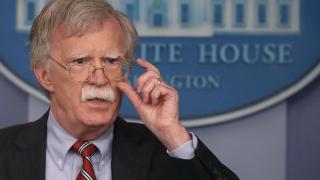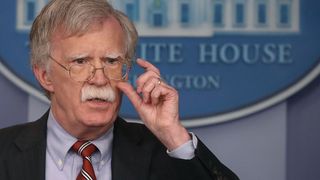Except for US national security adviser John Bolton, this latest fracas with Iran is a crisis nobody wants.
Not the US, which is thoroughly fatigued with the Middle East, and has less need for the region now that its domestic energy industry is booming.
Not Iran, which, despite its bluff, is playing a weak hand and surely knows it. Its military is outmatched, its economy is on the ropes, and it has no powerful friends in its corner to share some of the heat. Its actions come from a place of desperation, not strength.
And not the rest of the world, much of which still depends too heavily on Middle Eastern oil and gas. There's no need to explain the possible impact of a sustained Middle Eastern crisis on a global economy that is already looking fragile.
This puts Australia in a difficult position, and no doubt the Government is already thinking about how to respond if the US requests allied contributions — as it almost certainly will, should the crisis escalate.

Skating on thin oil
The Government needs to see this as the latest example of how much better positioned we would be for events like this if we thought more strategically.
We shouldn't need another reminder of the danger of being dependent on energy from a region so volatile as the Middle East.
According to the Government's Australian Petroleum Statistics, Australia has 26 days of petroleum supply, 28 days of jet fuel, and 21 days of diesel.
We are the only member country to fail to meet our International Energy Agency obligation of 90 days' supply of oil stocks. And at only 57 days of supply, we don't just miss it by a whisker.
While we can't replicate the boom in oil production the US has managed, there are other things we could have done, and could still do, to reduce our vulnerability.
We could build up domestic stockholdings, protect some domestic refining capacity, and more proactively encourage research and uptake of alternative energy sources.
All of these things have benefits beyond a Middle East scenario, and yet previous governments have consistently refused to factor strategic considerations into the issue of fuel supply, instead preferring short-term economic rationalism.
Should we follow the US?
Australia has operated alongside the US in virtually every mission in the Middle East over the past 30 years. That willingness on our part has given us a rare and valuable level of access and influence in Washington.
But it's a double-edged sword. It's easy for that to create expectations on the US side that we will continue to commit, and a fear on the Australian side that our hard-won gains will be lost if we say no.
It's not all about alliance management, of course. Australia also has significant sovereign interests in the Middle East.
Among other reasons, as a net importer of oil, we depend on stable flows and open sea lines. And as a trading nation, we want a confident global economy, not one thrown off balance by a Middle Eastern crisis.
It can seem a no-brainer, then, that we should err towards contributing to coalition operations.
But too often in the past the decision to contribute has been weighed in isolation, with not enough attention to the broader opportunity costs.
More than ever, that bigger picture needs to be front of mind for Canberra in deciding on future Middle Eastern commitments.
We need to be realistic
First, we often conflate our interests with our ability to affect them.
Australia may have significant interests in the Middle East, but in that theatre we have limited capacity to shape the outcome.
We can and have made a capable contribution, and that's not nothing. But with our own region becoming increasingly competitive, the argument for taking precious assets from a theatre where we can make a decisive contribution to one where we can't needs to be all the stronger.
Self-inflicted wounds
Second, alliance management goes both ways. If the US becomes embroiled in a conflict with Iran, it is a problem partly of its own making — a point many American commentators have been busily making.
The Joint Comprehensive Plan of Action may not have been perfect, but it was keeping the situation static.
And in the Middle East, sometimes static is the best we can hope for.
In pulling out of the agreement and then steadily ramping up sanctions, the US has boxed Iran into a corner.
That Washington would expect allied contributions to maintain Middle Eastern security is perfectly reasonable.
They may not be strictly necessary in an operational sense, but it's the principle of the thing.
The US shouldn't have to shoulder the burden on its own, especially when the US now needs the Middle East less than most of the rest of the world does.
But the US can't make decisions on policy in isolation and then expect allies to jump in when things go awry.
There is an important opportunity here for the Australian Government to raise expectations of our own about our thresholds for contributing.
With our interests — and frankly those of the US as well — under increasing pressure in the Indo-Pacific, those thresholds need to be higher.
And our thinking on how we collectively play to the respective strengths of allies and partners needs to be more sophisticated.
Thinking ahead
Hopefully conflict with Iran will be avoided — it's the last thing the Middle East, the US, or the rest of the world needs.
But these tensions are another opportunity for a significant rethink of how we conceive of our interests in the region, and how we work both independently and with partners to manage them.






